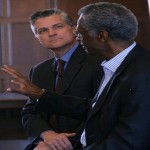Televising the Supreme Court
 Last month, Tony Mauro published a column in the National Law Journal (found here), highlighting the results of a public-opinion poll that researchers at Farleigh Dickinson University conducted to determine the level of support for televising proceedings at the Supreme Court. Sixty-one percent of Americans, the poll found, believed that televising the Court’s proceedings would be “good for democracy.” And that result, compared to the twenty-six percent of respondents who thought television would “undermine the authority and dignity of the court,” suggested that the researchers had found overwhelming public support for the idea — indeed, bipartisan support. For seventy-one percent of those who identified themselves as liberals favored the idea, and fifty-five percent of self-identifying conservatives did the same.
Last month, Tony Mauro published a column in the National Law Journal (found here), highlighting the results of a public-opinion poll that researchers at Farleigh Dickinson University conducted to determine the level of support for televising proceedings at the Supreme Court. Sixty-one percent of Americans, the poll found, believed that televising the Court’s proceedings would be “good for democracy.” And that result, compared to the twenty-six percent of respondents who thought television would “undermine the authority and dignity of the court,” suggested that the researchers had found overwhelming public support for the idea — indeed, bipartisan support. For seventy-one percent of those who identified themselves as liberals favored the idea, and fifty-five percent of self-identifying conservatives did the same.
The readers of this blog are undoubtedly familiar with the essential contours of the debate over televising the Court’s proceedings. Proponents argue that cameras would provide the public with greater access to an important public institution. They suggest following the mold of what C-SPAN has done for public debates and committee hearings in Congress. Opponents, essentially, believe that what might have worked for Congress will not work for the Court. They contend that cameras will alter the dynamic in the courtroom, allowing participants to play to a larger audience in a way that would diminish the value of oral arguments. Litigants may address the Court with less candor, preferring to speak in platitudes designed for the evening news, and the justices themselves may be less willing to ask pointed questions, lest they be misconstrued by a larger audience.

